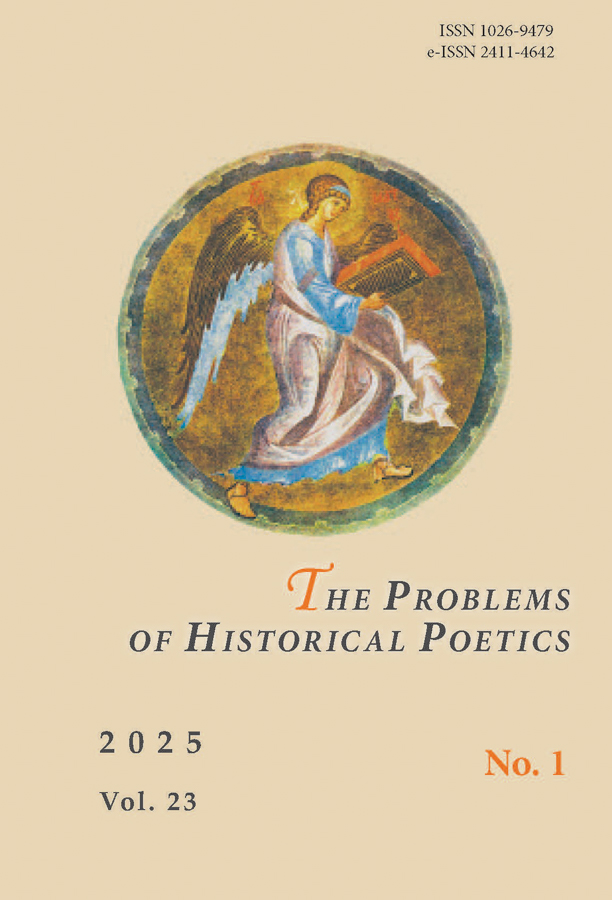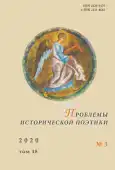About “realisms” (story by O. N. Olnem А Quiet Corner and literary memoirs of Sergey Durylin In the Native Corner)
- Authors: Karpenko G.Y.1
-
Affiliations:
- Samara National Research University
- Issue: Vol 18, No 3 (2020)
- Pages: 221-247
- Section: Articles
- URL: https://journal-vniispk.ru/1026-9479/article/view/285846
- DOI: https://doi.org/10.15393/j9.art.2020.7982
- ID: 285846
Cite item
Full Text
Abstract
The article studies and compares various possibilities of Russian classical realism, it reveals and describes the features of constructing images of the world in the works of O. N. Olnem (V. N. Tsekhovskaya) and S. N. Durylin. The pictures of the world by Olnem and Durylin are limited mainly by the manor topos. Localization of the events within the manor space is the key for the presence of the same objective and spiritual realities in the analyzed works, nevertheless, distributed and correlated differently. While the “narrative levels” in Durylin’s memoirs (subject, functional, socio-historical, subjective-personal, cultural-historical, Christian ones) are value-coordinative and the Orthodox determines theoanthropic “verticality” of the estate world, in Olnem’s description all the “estate elements” are coordinate and exist in the horizon of a personal or social event, they are factographic, only psychologically and / or socially colored, and the “Christian event lasting in eternity” loses its world-organizing function and is present as a formal rhetorical tradition. The difference in the actualization by Olnem and Durylin of the value of narrative levels is expressed in the implied meanings of the name — A Quiet Corner, In the Home Corner. The writers relate the “Manor Corner” to silence. However, if for Durylin the “quiet”, “silence” is a spiritual complex that expresses the Christ-like essence of a person, for Olnem, silence is a socio-historical category, designed to mark semantically the process of disappearance of the “noble nest,” silence as a synonym for death. Thus, no matter how close the work of the writers came together in substantive content, no matter how similar and related they were, the “watershed” separating them, in the words of V. V. Rozanov, turns out to be the “attitude to faith, God”. This difference determines the existence of different “realisms” in Russian literature and, consequently, of different reading and research strategies.
About the authors
Gennady Yu. Karpenko
Samara National Research University
Author for correspondence.
Email: karpenko.gennady@gmail.com
Doctor of Philology, Professor of the Department of Russian Foreign Literature and Public Relations
Russian Federation, Moskovskoe shosse 34, Samara, 443086References
- Gurevich A. M. Dinamika realizma: (v russkoy literature XIX v.) [The Dynamics of Realism: (in Russian Literature of the 19th Century)]. Мoscow, State Institute of Theater Arts Publ., 1994. 88 p. (In Russ.)
- Zakharov V. N. Christian Realism in Russian Literature (Problem Statement). In: Problemy istoricheskoy poetiki [The Problems of Historical Poetics]. Petrozavodsk, Petrozavodsk State University Publ., 2001, issue 6, pp. 5–20. Available at: http://poetica.pro/journal/article.php?id=2511 (accessed on 20 January, 2020). DOI: 10.15393/ j9.art.2001.2511 (In Russ.)
- Esaulov I. A. Kategoriya sobornosti v russkoy literature [The Category of Sobornost’ in Russian Literature]. Petrozavodsk, Petrozavodsk State University Publ., 1995. 288 p. (In Russ.) (a)
- Esaulov I. A. Spektr adekvatnosti v istolkovanii literaturnogo proizvedeniya («Mirgorod» N. V. Gogolya) [The Spectrum of Adequacy in the Interpretation of a Literary Work (N. V. Gogol’s “Myrgorod”)]. Moscow, Russian State University for the Humanities Publ., 1995. 102 p. (In Russ.) (b)
- Esaulov I. A. Paskhal’nost’ russkoy slovesnosti [Paskhal’nost’ of Russian Literature]. Мoscow, Krug Publ., 2004. 560 p. (In Russ.)
- Esaulov I. A. Christian Realism as an Artistic Principle of Pushkin and Gogol. In: Gogol’ i Pushkin: Chetvertye Gogolevskie chteniya [Gogol and Pushkin: The Fourth Gogol Readings]. Мoscow, Knizhnyy dom Universitet Publ., 2005, pp. 100–108. (In Russ.)
- Esaulov I. A. New Categories of Philological Analysis for the Comprehension of the Essence of Russian Literature. In: Literaturovedcheskiy zhurnal [Literary Journal], 2007, no. 21, pp. 3–14. (In Russ.) (a)
- Esaulov I. A. Christian Realism as an Artistic Principle of Russian Classical Literature. In: Fenomen russkoy dukhovnosti [A Phenomenon of Russian Spirituality]. Kaliningrad, Immanuel Kant Russian State University Publ., 2007, pp. 9–20. (In Russ.) (b)
- Esaulov I. A. Russkaya klassika: novoe ponimanie [Russian Classics: a New Understanding]. St. Petersburg, Russian Christian Academy of Humanities Publ., 2017. 550 p. (In Russ.)
- Karpenko G. Y. About the Type, the Typical in the “Physiological Sketch”. In: Problemy poetiki russkoy literatury XIX–XX vekov. Pamyati professora V. P. Skobeleva. Sbornik nauchnykh statey [The Problems of Poetics of Russian Literature of the 19th–20th Centuries. In Memory of Professor V. P. Skobelev. Collection of Scientific Articles]. Samara, Samara State University Publ., 2005, pp. 151–160. (In Russ.)
- Lyubomudrov A. M. Dukhovnyy realizm v literature russkogo zarubezh’ya: B. K. Zaytsev, I. S. Shmelev [Spiritual Realism in Russian Literature Abroad: Boris Zaitsev, Ivan Shmelev]. St. Petersburg, Dmitriy Bulanin Publ., 2003. 272 p. (In Russ.)
- Markovich V. M. On the Transformations of the “Natural” Short Story and Two “Realisms” in Russian Literature of the 19th Century. In: Russkaya novella: problemy teorii i istorii. Sbornik statey [Russian Short Story: Problems of Theory and History. Collection of Articles]. St. Petersburg, Saint Petersburg State University Publ., 1993, pp. 113–134. (In Russ.)
- Prokhorov G. M. «Nekogda ne narod, a nyne narod Bozhiy…» Drevnyaya Rus’ kak istoriko-kul’turnyy fenomen [“In Former Times not Even People, but Now the People of God…” Ancient Russia as a Historical and Cultural Phenomenon]. St. Petersburg, Izdatel’stvo Olega Abyshko Publ., 2010. 320 p. (In Russ.)
- Tunimanov V. A. Marginal Notes on the Letters of V. V. Rozanov to N. K. Mikhailovsky (About “Double Morality”, “Cruelty” and “Gentleman with Retrograde Physiognomy”). In: Dostoevskiy. Materialy i issledovaniya [Dostoevsky. Materials and Researches]. St. Petersburg, Nauka Publ., 2000, vol. 15, pp. 44–66. (In Russ.)
- Chernykh P. Y. Istoriko-etimologicheskiy slovar’ sovremennogo russkogo yazyka: v 2 tomakh [Historical and Etymological Dictionary of the Modern Russian Language: in 2 Vols]. Мoscow, Russkiy yazyk Publ., 1994, vol. 2. 560 p. (In Russ.)
Supplementary files











